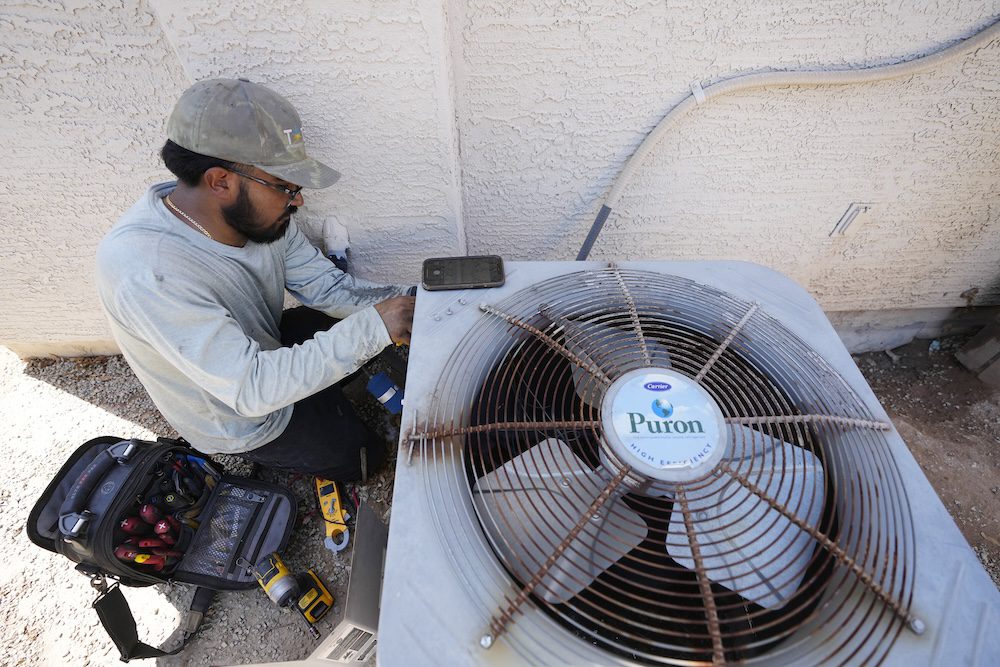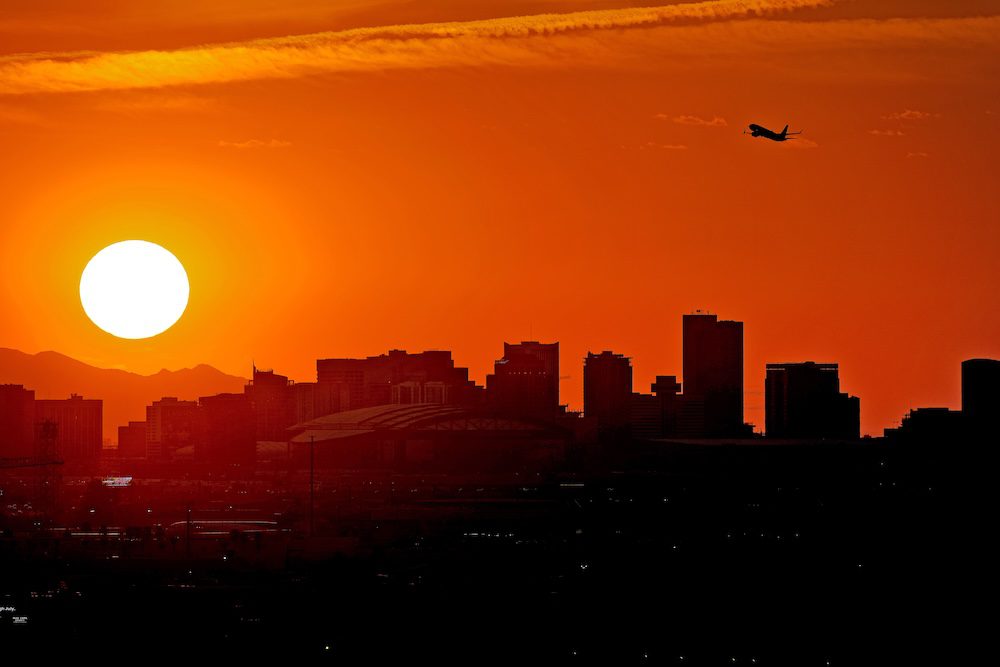
Total Refrigeration service tech Michael Villa works on replacing a fan motor on an air conditioning unit as temperatures are expected to hit 117-degrees Wednesday, July 19, 2023, in Phoenix. Most of the Maricopa County's 645 heat-related deaths last year were outdoors, but 156 people died in their homes. (AP Photo/Ross D. Franklin)
Most heat-related deaths involve homeless people living outdoors. But those who die inside without sufficient cooling are also vulnerable, typically older than 60, living alone, and with limited income.
Mexican farm worker Avelino Vazquez Navarro didn’t have air conditioning in the motor home where he died last month in Washington state as temperatures surged into the triple digits.
For the last dozen years, the 61-year-old spent much of the year working near Pasco, Washington, sending money to his wife and daughters in the Pacific coast state of Nayarit, Mexico, and traveling back every Christmas.
Now, the family is raising money to bring his remains home.
“If this motor home would have had AC and it was running, then it most likely would have helped,” said Franklin County Coroner Curtis McGary, who determined Vazquez Navarro’s death was heat-related, with alcohol intoxication as a contributing cause.
Most heat-related deaths involve homeless people living outdoors. But those who die inside without sufficient cooling are also vulnerable, typically older than 60, living alone, and with limited income.
Underscoring the inequities around energy and access to air conditioning as summers grow hotter, many victims are Black, Indigenous or Latino, like Vazquez Navarro.
“Air conditioning is not a luxury, it’s a necessity,” said Mark Wolfe, executive director of the National Energy Assistance Directors’ Association, which represents state energy assistance programs. “It’s a public health issue and it’s an affordability issue.”
People living in mobile homes or in aging trailers and RVs are especially likely to lack proper cooling. Nearly a quarter of the indoor heat deaths in Arizona’s Maricopa County last year were in those kinds of dwellings, which are transformed into a broiling tin can by the blazing desert sun.
“Mobile homes can really heat up because they don’t always have the best insulation and are often made of metal,” said Dana Kennedy, AARP director in Arizona, where many heat-related deaths occur.
Research shows mobile home dwellers are particularly at risk in blistering hot Phoenix, where 113-degree Fahrenheit (45 Celsius) weather is forecast for this weekend.
“People are exposed to the elements more than in other housing,” said Patricia Solís, executive director of the Knowledge Exchange for Resilience at Arizona State University, who worked on mapping hot weather impacts on mobile home parks for a state preparedness plan.
Worse, some parks bar residents from making modifications that could cool their homes, citing esthetic concerns. A new Arizona law required parks for the first time this summer to let residents install cooling methods such as window units, shade awnings and shutters.
In Arizona’s Maricopa County, home to Phoenix, 156 of 645 heat-related deaths last year occurred indoors in uncooled environments. In most cases, a unit was present but was not working, was without electricity or turned off, public health officials said.
One victim was Shirley Marie Kouplen, who died after being overcome by high temperatures inside her Phoenix mobile home amid a heat wave when the extension cord providing her electricity was unplugged.
Emergency responders recorded the 70-year-old widow’s body temperature at 107.1 F (41.7 C). Kouplen, who was diabetic and had high blood pressure, was rushed to a hospital, where she died.
Kouplen apparently was struggling financially, if the shabby condition of her mobile home was any indication. It still sits on Lot 60, surrounded by a chain-link fence with a locked gate and a dirt driveway overgrown with weeds.
It’s unclear how the cord got unplugged, if Kouplen had an electricity account or how she got her power.
“Losing your air conditioning is now a life-threatening event,” said Texas A&M University climate scientist Andrew Dessler, who grew up in hot, humid Houston in the 1970s. “You didn’t want to lose your air conditioning, but it wasn’t going to kill you. And now it is.”
Arizona’s regulated utilities have been banned since 2022 from cutting off power during the summer, following the 2018 death of a 72-year-old woman after Arizona Public Service disconnected her electricity over a $51 debt.
Ann Porter, spokesperson for Arizona Public Service, which provides electricity to homes in the park where Kouplen lived, said “due to privacy concerns” the company could not say if she had an account at the time of her death or in the past. Porter said the utility does not cut power from June 1 to Oct. 15.
Cutoffs can occur after those dates if mounting debts are not paid.
Arizona is among 19 states with shut-off protections, leaving about half of the U.S. population without safeguards against losing electricity during the summer, the National Energy Assistance Directors Association said in a new study.
Almost 20% of very-low income families have no air conditioning at all, especially in places like Washington state where they weren’t commonly installed before climate-fueled heat waves grew increasingly stronger, frequent and longer lasting.
In the Pacific Northwest, several hundred people died during a 2021 heat wave, prompting Portland, Oregon, to launch a program to provide portable cooling units to vulnerable, low-income people.
Chicago, better known for its cold winters, saw a heat wave kill 739 mostly older people over five days in 1995. Amid high humidity and temperatures over 100 F (37.7 C), most victims had no air conditioning or couldn’t afford to turn on their units.
In 2022, Chicago adopted a cooling ordinance after three women died in their apartments in a building for older adults on an unusually warm spring day. Certain residential buildings must now have at least one air conditioned common area for cooling when the heat index exceeds 80 F (26.6 C) and cooling is unavailable in individual units.
Nonprofits in historically hotter areas like Arizona also are trying to better address the inequities low-income people face during the sweltering summers. The Phoenix-based community agency Wildfire recently raised money to buy over $2 million worth of air conditioning equipment to help 150 households statewide over three years, Executive Director Kelly McGowan said.
Laws protect renters in some places. Phoenix landlords must ensure air conditioning units cool to 82 F (28 C) or below and that evaporative coolers lower the temperature to 86 F (30 C).
Palm Springs, California, and Las Vegas, both desert cities, have ordinances requiring landlords to offer air conditioning in rental dwellings. Dallas, where temperatures can pass 110 F (43.3 C) in the summer, has a similar law.
But most renters pay their own electricity costs, leaving them to agonize whether they can afford to even turn on the cooling or how high to set the thermostat.
A new report estimates the average cost for U.S. families to keep cool from June to September will grow nationwide by 7.9% this year, from $661 in 2023 to $719 this summer.
Wolf noted the federal Low Income Home Energy Assistance Program, which grants money to states to help families pay for heating and cooling, is underfunded, with 80% going to heat homes in winter.
At Kouplen’s mobile home park, Spanish-speaking neighbors had little interaction with “Señora Shirley,” who used a walker to take her two small dogs outside. Neighbors said the animals were adopted after her death.
Kouplen was buried in northern Phoenix at the National Memorial Cemetery of Arizona alongside her husband, JD D. Kouplen, who died in 2020.
“Never Forgotten,” their shared marker reads.

Arizona bill ignores climate change, blames poor air quality on other countries
When it comes to HCM 2010, a piece of legislation that attempts to pass the blame for Arizona’s emission pollution levels, the name of the game is...

Why climate activists oppose Arizona Sen. Frank Carroll’s proposal to confront poor air quality
A proposed state law that its sponsor says could improve Arizona’s air quality has met an unlikely foe: climate activists. Senate Bill 1128 would...

Earth records hottest year ever in 2024 and the jump was so big it breached a key threshold
Earth recorded its hottest year ever in 2024, with such a big jump that the planet temporarily passed a major climate threshold, several weather...

Kris Mayes sues ‘nuisance’ corporate mega-farms for exploiting Arizona’s groundwater rules
The state of Arizona filed a lawsuit Wednesday against a corporate farm operating in La Paz County, claiming years of excessive groundwater pumping...




